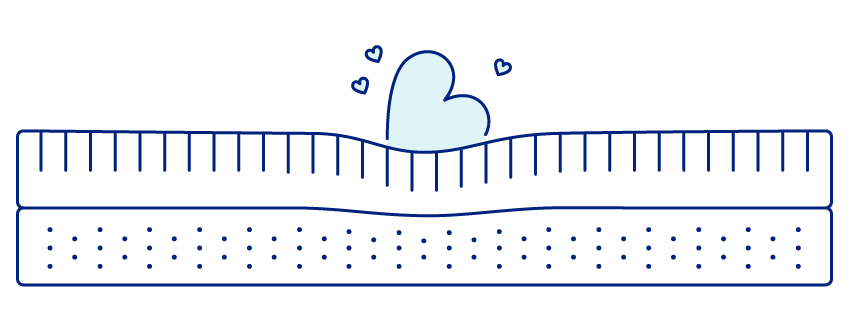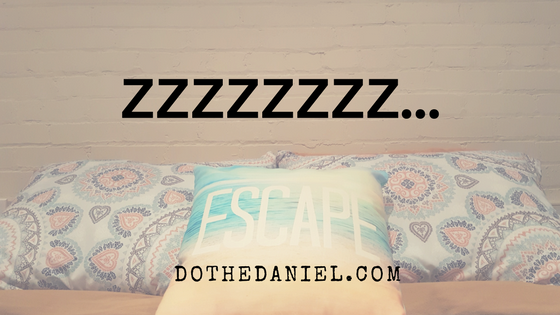Did you know that on average we spend approximately 227,468 hours or 26 years of our lives sleeping? That’s a whole heck of a lot of time. According to the National Centre on Sleep Disorders Research, this amounts to 33% of our entire lifetime spent sleeping. So, other than taking up a 1/3rd of our lives, why is it so darn important?
Some of the roles of sleep are to help regulate your metabolism, reduce inflammation, modulate your immune system and aid in balancing your hormones. Too much or too little sleep has been associated with a shorter lifespan. It’s also needed to restore appetite hormones to their normal levels – which means it can even play a role in your cravings during the day!
There is no hard and fast rule about how much sleep is enough, because every individual’s requirements are different. But, most adults require about eight hours of sleep nightly in order to perform at peak function during the day. And as a general rule, children and adolescents usually require even more sleep than adults. So, if your child begins to show signs of not getting enough sleep, and you want to know how much sleep they are getting, you may want to check out this sleep calculator for kids on sleepify so they can get the help they need if they need it.
Once they are actually asleep some people even suffer from debilitating nightmares as a result of PTSD. These can be difficult to cope with and, more surprisingly, some marijuana statistics seem to suggest that cannabis may play a part in stopping or decreasing the frequency of these bad dreams for sufferers of nightmare disorders. It therefore seems that our sleep cycles are intrinsically linked to our everyday lives.
Ultimately, not getting enough sleep, or not getting proper sleep can affect your mood, ability to pay attention and overall performance. If chronic, inadequate sleep compromises productivity, creates problems in relationships and can contribute to major health problems. So, what can you do to ensure that you are mastering this 1/3rd of your life? Well, many people would argue that owning a high-quality matress is a great way to ensure that you get an adequate amount of sleep. That is why many people decide to go to places like zenhavencoupon.org for their mattress. Getting the right mattress is extremely important in helping you have a good night’s sleep. If you are unsure about what mattress to get, then it would be a good idea to check out the Best and worst mattresses here to help give you a bit of a better idea of what you should get. I’ve put together some more of my top tips to help you get a better sleep!

Make your bedtime a routine because the body LOVES routine!
- Try to do the same thing before bed every night if you can – your body will start to feel sleep as more of a habit.
- Don’t eat a meal within 2 hours of bedtime. You want your body to focus on sleeping, not on digesting a big meal. You should have already done some of that work before crawling into bed.
- Avoid caffeine, alcohol or nicotine within four to six hours of bedtime. Each one of these disrupts your sleep cycles later on.
- Ditch the sugar! Sugar contains something called tyramine, which releases norepinephrine, a brain stimulant. Not to mention some of the other negative effects it can have on your body!
- Go to bed when you are sleepy at night, don’t try to push through it. Your body is trying to tell you something!
- Try your best to keep a regular sleep-wake cycle. Go to bed at the same time every day and get up at the same time. This is fantastic for regulating your circadian rhythm.

Stress and sleep go hand in hand. If you are stressed, you won’t sleep well. But if you don’t sleep well, it can lead to higher stress levels. Get down to the root of the problem and work on handing that stress!
- Light stretching, yoga, deep breathing or meditation to transition your mind and body into sleep.
- Have a hot bath with epsom salts to calm the mind and the body, or even a hot shower.
- Exercise is wonderful for stress management, but it’s also beneficial for sleep. Physical exertion is an excellent way to make your body tired. But, try not to exercise within 2 hours of bedtime.

Electronics are meant to be stimulants – shut those babies off if you want to sleep properly!
- Gently escort all electronic devices out of your bedroom, if you can.
- If you are sleeping with your phone in your bedroom, turn your phone off or to “airplane mode”. This will stop any EMFs from traveling to your head, which will disrupt sleep.
- Stay away from all electronics at least one hour before bed. The blue light emitted causes disruption to your melatonin production (your sleep hormone). Plus, these things are stimulants – they want to keep you up and grab your attention!

There are lots of wonderful herbal remedies, essential oils and teas to help with sleep!
- Turn on your essential oil diffuser and add in calming oils like Lavender, Rose or Ylang Ylang.
- Herbal teas like Tulsi or Chamomile help to relax the nervous system (note: do not use Chamomile if you are allergic to Ragweed).
- Valerian, California Poppy, Lemon Balm, Passionflower all help to relax the nervous system. There are so many great herbal tinctures or supplements you can take, but be sure to read the warning labels to check for contraindications first (i.e.: you should not take some of these if you are an on SSRI or breastfeeding) and talk to a health professional.

Thoughts floating around in your head before sleep or waking you up at night? Write it down.
- Keep a journal beside your bed – that way you can do a “mind dump” and release what you need to before bed.
- Ease the mind before sleep by writing down what you are grateful for that day, this will shift your mindset.
- Having vivid dreams? Put it all down in writing the next morning. Maybe they are trying to tell you something important!

Maybe you aren’t sleeping well because you are lacking in a specific nutrient. Alongside a healthy lifestyle and balanced diet, supplementation can help!
- Although I wouldn’t recommend this as a first course of action, supplementing with Melatonin at a dose of 3mg to start is great about 1/2 hour before bed. Try not to overuse Melatonin as studies have shown that more than an occasional use can permanently stop the body’s own ability to produce this vital hormone.
- Drink tart cherry juice. Just 1/2 a cup will help as it contains a sleepy amino acid called, L-Tryptophan.
- Magnesium Bisglycinate or Citrate helps to relax muscles and nourish the nervous system. Lacking in the nutrients Magnesium and Calcium can actually cause you to wake up after a few hours of sleep, without the ability to return to it right away.

Your body requires a certain environment to obtain optimal sleep – and let’s not forget how important it is for your comfort level!
- Keep your room cool, dark, and quiet because it’s the best environment for producing Melatonin.
- Get nude! Did you know that you can also burn more calories if you sleep without any clothes on? Your body will work on trying to warm up to room temperature. But if you do wear clothes – make sure they are the right ones (i.e. PJs not gym clothes) in order to send a message to your body that it is time for sleep!
- Sleep and sex only, my friends! Remember that your bed is for meant for intimacy and sleep. Get those pets off of the bed, no getting work done on the bed, no eating on the bed! This tricks your mind into knowing that your bed is for SLEEP and getting it on ONLY!
- Your comfort is important! Make sure to use the right mattress in order to provide proper support and alignment for your body. And that’s why I’m a huge fan of the Casper Mattress.
So, why do I love Casper so much? Casper understands that there are four key factors that affect sleep quality when it comes to your mattress: comfort, support, temperature, and durability. Not only is their mattress soft and cushy, but it provides excellent support and stays cool through the night. The secret to their mattress is the combination of pressure-relieving memory foam under a springy, breathable comfort layer. The top layer provides just enough sink, so you always feel fully supported by the pressure-relieving memory foam layer beneath. And trust me, it has been life-changing for me sleep-wise!
Casper understands that there are four key factors that affect sleep quality when it comes to your mattress: comfort, support, temperature, and durability. Not only is their mattress soft and cushy, but it provides excellent support and stays cool through the night. The secret to their mattress is the combination of pressure-relieving memory foam under a springy, breathable comfort layer. The top layer provides just enough sink, so you always feel fully supported by the pressure-relieving memory foam layer beneath. And trust me, it has been life-changing for me sleep-wise!
Unlike most mattresses, Casper is free from harmful chemical flame retardants and instead uses a purely mechanical fire sock made from silica threads. They also use a Greenguard-Certified, water-based adhesive for laminating their foams, rather than the solvent-based adhesives found across the industry. This is so important because you don’t want to spend 1/3 of your life lying in a face full of chemicals! No thanks.
I also love their 100 night trial period! This post-purchase, risk-free 100-night trial serves as their return policy. If you decide the Casper mattress is not for you, they send a courier over to remove the mattress from your home and either donate it to a local charity or have it recycled. This includes everything in their selection, like their sheets, pillows and even dog beds! Why not give it a shot? It’s one of the best sleep decisions I’ve ever made.

Just in case you weren’t able to join our Facebook Live video, you can watch it below:
Sweet dreams!
Be sure to follow along with my Instagram account! For more information and helpful tips, make sure to stay up to date with all things Health & Nutrition on my website, Catherine’s Cabinet.
Don’t forget to sign up for the DoTheDaniel.com Newsletter
In health,
Catherine Sugrue, CNP
Holistic Nutritionist
*Please note that this is a sponsored post – our disclosure can be found at all times by clicking here.
Please note: Do not avoid seeing your doctor, should you feel that this could be a sleep disorder or linked to a serious health issue.
Reference notes: https://www.reference.com/science/many-years-life-spend-sleeping-8f04fc7719fa8eb3
Photos: Catherine Sugrue & Casper
